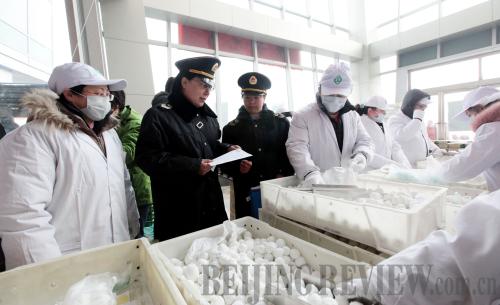|
 |
|
CLOSE MONITORING: Food safety regulators inspect the workshop of Jinfang Snack Restaurant in Beijing on February 16. The newly amended Criminal Law imposes harsher punishments to people responsible for food safety mishaps (CFP) |
"Social law is a new legal concept, mainly dealing with affairs concerning social security, social assistance, public welfare and community special care," said Zheng.
"The Social Insurance Law is the first law in China's social laws. It is a basic law," said Zheng. "Its establishment not only promotes the construction of China's social security system but also is an important sign of the establishment of the socialist legal system with Chinese characteristics."
Enforcement
Upon completing the comprehensive socialist legal system, Wu called on lawmakers to continue striving at their appointed tasks and, at the same time, to pay more attention to the revision and improvement of existing laws.
"We should put even more efforts into legislation, since our legal system is not perfect yet," Wu said. "It is not static or closed to change, but should constitute a long-term procedure for improvement needed to adapt to new social situations."
Wu emphasized law enforcement is essential to the legal system.
He said, with the establishment of the system, problems in law enforcement had become more prominent and aroused concern.
"We should come up with measures to ensure the authority of the Constitution and other laws, to safeguard the law's authority and dignity, and also to maintain justice," Wu said. "No organization or individual is above the Constitution and the law. All acts that violate the Constitution or laws must be punished."
The awareness of the rule of law should be promoted among all members of society, to ensure effective law enforcement, Wu said.
He urged officials and civil servants to take the lead in obeying the Constitution and laws.
He said the public should be taught to safeguard their legal rights.
Wu also urged lawmakers to find ways to let the public take part in the legislative processes.
Lawmakers should be cautious, perform research and reach a comprehensive consensus before submitting draft laws that lead to debate, he said.
New China's first Constitution, promulgated in 1954, was debated for about two years before being enacted, involving some 150 million citizens. And this has left a tradition of listening fully to people's voice when formulating laws and regulations.
In 2001, the top legislature received more than 3,000 letters from around the country offering advice after it publicized a draft amendment to the Marriage Law.
When a draft law on food safety was unveiled in 2008, the public sent more than 10,000 pieces of advice to the NPC Standing Committee.
During the 1980s and 1990s, the top legislature publicized 10 draft laws through newspapers to solicit suggestions and advice from the public, and in April 2008, the NPC Standing Committee decided all laws reviewed by the top legislature should be publicized for public feedback.
On March 4, Li Zhaoxing, spokesman for the this year's full session of the NPC, said China will always make laws based on national conditions, while considering, but not slavishly imitating foreign legislative experience.
"We won't enact laws that do not conform to China's national conditions and reality. And laws that are required by reality will be enacted with no delay," Li said.
Meanwhile, Wang Liming, another professor at Renmin University of China, said China still lacked a civil code.
At present, China only has one codified law, the Criminal Law.
"In order to speed up the systematization of China's civil laws and the establishment of civil code, the top legislature should formulate the general principles of civil law as soon as possible," Wang said.
He said the general principles of civil law can set behavior criteria for natural and legal persons to carry out civil legal actions and provide basic rules for judges to deal with civil disputes. | 